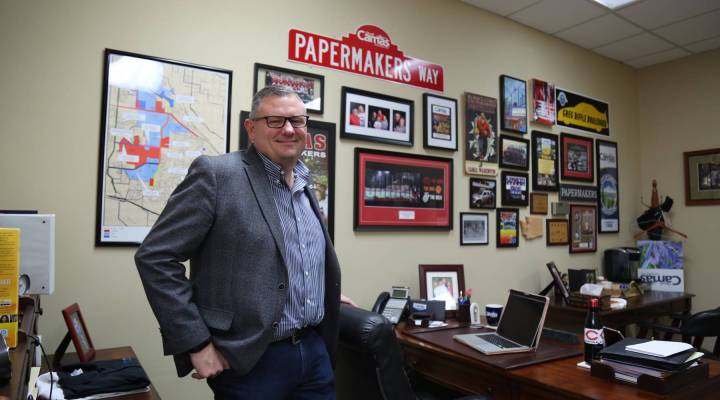
What the loss of a mill means to a town

The papermaking past of Camas, Washington, is entrenched in the town’s DNA. Nowhere is that more apparent than when you walk into the high school auditorium, where the varsity basketball team is playing its season opener. This is the home of the Papermakers. The name alludes to the 134-year old paper mill that at its peak was the second largest in the world, employing nearly 3,000 people. The company Georgia-Pacific recently announced it will begin to shut down most of its production, a sign that the landmark on the Columbia River may soon disappear.
Signs of Camas’ papermaking past are sprinkled throughout the campus. A large banner in the auditorium is decorated with rolls of toilet paper and spells out the school’s fight song, detailing its founding as a mill town. And then there’s Camas’ mascot. It used to be Joe Papermaker, but now it’s the Mean Machine, an animated paper roller that fires up the crowd during time outs.
Sitting in the back row of the bleacher stands is Wayne Rash. He’s a former mill worker who graduated from Camas High in 1964. “I come to all the games. It doesn’t matter which sport,” he said. Rash said when he was growing up, almost everybody lined up for a job at the mill after graduation. Nowadays, most of the kids in this auditorium wouldn’t even consider that.
“It used to be the only thing in town,” Rash said. “But they’ve added a whole lot of other industry here now.”
The mill will start to wind down paper and pulp operations in the spring, which means up to 300 people will likely lose their jobs. Regional state economist Scott Bailey says the loss of mills in the Pacific Northwest is nothing new. Since 2000, nearly ten paper mills have shut down in Oregon and Washington.
“There are other areas, rural areas, where there’s very few job opportunities left,” Bailey said. “And it’s really devastated towns.”
| Is retraining worth it? Laid off paper workers weigh the benefits |
| In North Carolina, an old mill town reinvents itself |
| As fewer farmers work the land, the small town way of life fades |
But Camas is different. In fact, many would argue it hasn’t been a mill town for quite some time. Back in the 1970s, a big union strike threatened to bring the city to a halt.
“There were a lot of us that realized that the golden goose could die any moment and we would be in financial ruin,” said former Camas Mayor Nan Henriksen.
Nearly 70 percent of the city’s property tax revenues came from the mill. Henriksen knew Camas needed to attract new industry. So, when a plot of land became available, the city annexed it, and turned it into a business park. But that had some wondering whether the city was losing its mill town roots.
“That was a real time of crisis and questioning who we were and what we would be in the future,” Henriksen said.
Soon high-tech companies like Hewlett-Packard, WaferTech, and Sharp moved in, bringing big money and white-collar jobs. Camas saw its population grow from about 6,000 to more than 20,000 in just two decades. Current Mayor Scott Higgins says all those changes mean Camas is really not a mill town anymore.
“I think it’s more psychological than it is financial for the majority of the residents of the city,” Higgins said. “For most people, it’s more a piece of who we are that is going away and how do you replace that or do you? This would have been devastating to Camas 30 years ago,” explained Higgins, referring to the mill layoffs and a significant portion of the mill closing operations. “But today, we likely won’t even notice the financial impact.”
Now Camas is praised as a model town. Its median income is close to $95,000, nearly double the median income in neighboring Vancouver, Washington.
But there’s still evidence of Camas’ papermaking roots. Daily reminders can be found all over town, including back at the high school. Last year, the football team went undefeated, going to the state championship, and winning, for the first time. The city recognized them by renaming the street along the campus: Papermakers Way.
There’s a lot happening in the world. Through it all, Marketplace is here for you.
You rely on Marketplace to break down the world’s events and tell you how it affects you in a fact-based, approachable way. We rely on your financial support to keep making that possible.
Your donation today powers the independent journalism that you rely on. For just $5/month, you can help sustain Marketplace so we can keep reporting on the things that matter to you.












